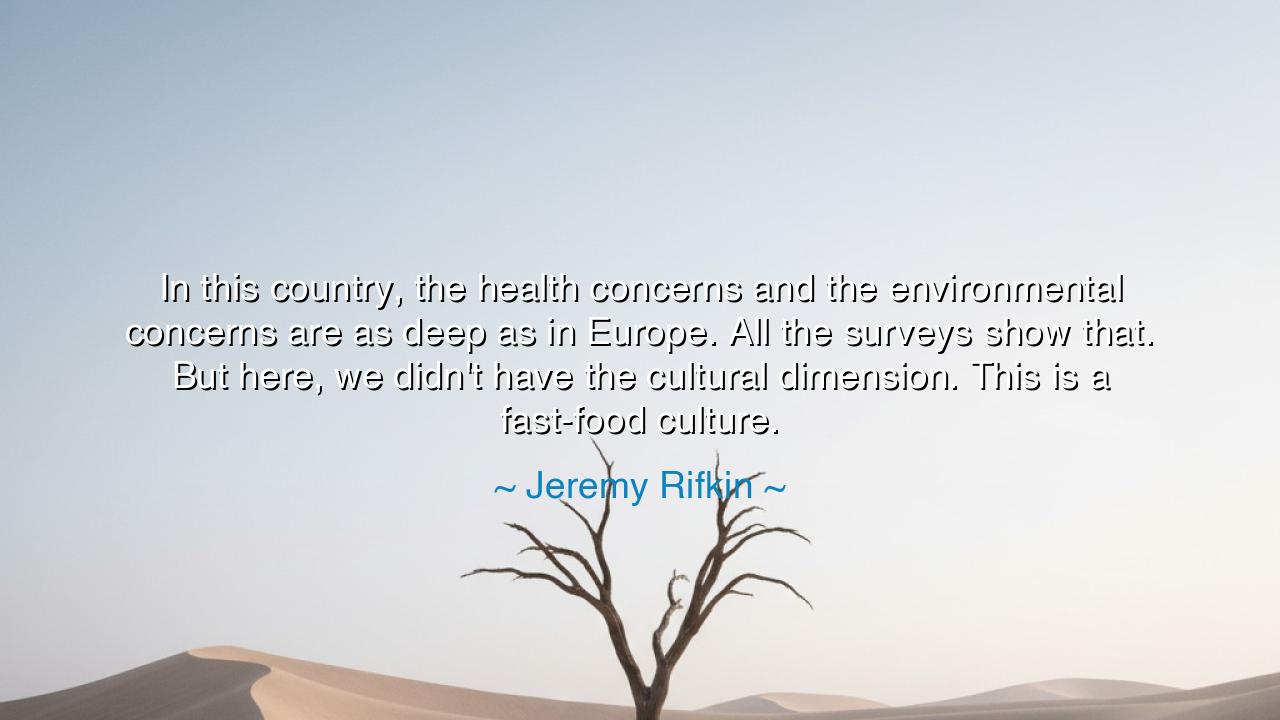
In this country, the health concerns and the environmental
In this country, the health concerns and the environmental concerns are as deep as in Europe. All the surveys show that. But here, we didn't have the cultural dimension. This is a fast-food culture.






Jeremy Rifkin, thinker and critic of the modern age, once declared with unflinching clarity: “In this country, the health concerns and the environmental concerns are as deep as in Europe. All the surveys show that. But here, we didn’t have the cultural dimension. This is a fast-food culture.” His words strike like a bell in the night, calling us to awaken to the truth that the struggles of body and earth are not born from ignorance alone, but from the very habits and traditions that shape a people’s way of life.
The meaning of his declaration is both simple and profound. Rifkin acknowledges that Americans feel the same weight of health concerns and environmental concerns as their European counterparts. The air grows polluted, the body suffers from poor diet, the land groans beneath overuse—these problems are universal. Yet he points out a crucial difference: the cultural dimension. In much of Europe, food and eating remain tied to tradition, ritual, and community. Meals are slow, intentional, rooted in history. In contrast, America birthed the fast-food culture, where nourishment is reduced to speed and convenience, stripped of its social and spiritual weight.
The origin of this reflection lies in Rifkin’s long study of economics, culture, and the environment. He has long warned that a culture without reverence for its practices of consumption cannot sustain either its people or its planet. His words reveal that culture itself is a form of wisdom—a lens through which societies balance desire with restraint, appetite with reverence. When culture dissolves into haste and efficiency, the consequences appear not only in individual health, but also in the degradation of the environment.
History bears witness to the importance of culture in sustaining life. Consider the Mediterranean diet, rooted in centuries of tradition, where food is shared communally, prepared with care, and tied to seasonal cycles of the earth. Studies reveal that such traditions not only preserve health, but also protect the land through sustainable practices. Contrast this with the rise of fast-food chains in the United States during the twentieth century. Meals once taken at tables with family were replaced with meals consumed in cars, under fluorescent lights, served in disposable wrappers. Health declined, obesity rose, and the throwaway habits of the table extended to the earth itself.
There is a deeply emotional current in Rifkin’s words, for they reveal loss. To say “this is a fast-food culture” is not merely to describe eating habits—it is to lament the fading of patience, the neglect of tradition, the erosion of community. Food, once a symbol of life’s rhythm, became an emblem of haste and consumption. Rifkin grieves not only for the body or the environment, but for the soul of culture itself, stripped of meaning in pursuit of speed.
To future generations, his words offer both warning and guidance. The warning: if culture is allowed to be shaped only by convenience, then both health and environment will collapse under its weight. The guidance: seek to reclaim culture as a source of wisdom, to restore the rituals of care, patience, and community in the way we eat, live, and consume. For culture, when rooted in reverence, becomes a safeguard that laws and policies alone cannot provide.
The lesson is this: slow down, and live with intention. Practically, this means rejecting the careless habits of the fast-food culture—eating mindfully, choosing foods that sustain health and earth alike, and valuing the shared table as much as the meal itself. It means creating cultural practices in your own life that honor both your body and the world around you. For when culture is rebuilt with reverence, both people and planet may yet be healed.
Thus Jeremy Rifkin’s words endure: “The health concerns and the environmental concerns are as deep as in Europe… but here, we didn’t have the cultural dimension. This is a fast-food culture.” Let them be a reminder that the battle for the earth and the body cannot be fought with science and policy alone, but must also be fought at the table, in the kitchen, and in the heart of culture itself. For it is culture that shapes daily life—and daily life, multiplied by generations, shapes the destiny of the world.






AAdministratorAdministrator
Welcome, honored guests. Please leave a comment, we will respond soon